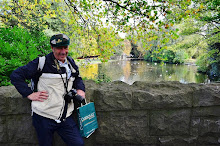BLANDFORDIAN DELIGHTS
It looks down on you.
Wherever you are at Rocky Cape, it’s above you, taunting you to take up
the challenge. Every previous trip I’d
resisted. It is, after all, a long way
up and much of the scenery below is worthy of your time as well.

We’d done the North Cave, been down to the rocky beach, stayed at the wharf overnight, been to the lighthouse; there were few options left so, the decision was made. It was only an hour return, piece of cake.
Well, except it was all uphill one way and it was over loose
rocks, something I’d sworn not to walk on ever again. However, they were nowhere as bad as Bishop
and Clerk. Poles at the ready, we set
out up the hill, following the track that also takes you to Sisters Beach, if
you want to do the three-hour thing.
Since it was decidedly overcast and rain was forecast, Mount
Blandfordia seemed like the more sensible option.
In case you were wondering, the name comes from the earl of
Blandford a couple of centuries ago and it’s a Christmas bell plant that grows
only in Tasmania, a smaller version of the ones most people on the mainland are
familiar with, and this is its western extremity. I actually saw one but didn’t realise its
importance and concentrated on photographing other flowers, all of which were
so tiny as to almost escape notice.
Some coastal heath, manuka, parson’s bands, fringe myrtle and one other all ended up in the photo storage.
When we reached the turnoff from the Sisters Beach trail I
remember glancing up and hoping there would be amazing views over the
hinterland when we reached the top and then pushed upwards with new
inspiration.
It's all uphill from here!
At the top it’s rugged and difficult but doable as you
scramble over the summit cluster of large rocks to get to the very top. The views are expansive, to say the
least. You can see The Nut at Stanley
from here and all the way to Wynyard on the other side. Bass Strait forms a contrasting background to
the foliage and ragged shoreline. It’s
something you can’t absorb quickly, but something you’ll never forget.
Later on, a walk along the beach where all the strata are
tilted at around 70 degrees, and jagged as well, makes for more difficult
walking, much harder than the hill in fact.
It’s the lichen covered rock I’m after, having only recently learned
that there is no such thing as a singular lichen plant, it’s more a structural
combination between an alga and a fungus.
The two link to make an extraordinarily strong pairing that can survive
on the exterior exposed surfaces of rock and man-made walls and such. The colours also make a lovely foreground for
photographs!
It was along here we came across girls collecting driftwood,
presumably for a fire that night. It
must have been somewhere else because you’re not allowed to camp overnight here.
Next stop was the South Cave, a tortuous short track up to
where our indigenous population once camped, before they were wiped out. It’s reasonably spacious but the walls, in
line with everything else, are tilted over at that same geological angle that
predominates here and has caused the odd outlines you see. It’s also a bit deeper than it looks
initially, but without a reliable torch I choose not to explore further.
We’d wandered around Rocky Cape for much of the day and left satisfied that we’d seen most of it, well, except for the underwater bits which are purported to rival the Great Barrier Reef in diversity and amazing wildlife.
We actually found an amazing skeleton along the shoreline of a dead fish with extraordinarily large eyes and weird long spikes all over its body, a sure sign it had once been in deep water because that’s where these bizarre things exist.
Simply strange and surreal
The water here is so clear and uncontaminated it must beckon
experienced divers like a magnet to see the extraordinary creatures that exist
offshore. Sadly, I will never be among
them but do envy some of the amazing scenes they witness.
That’s what Rocky Cape has to offer.














0 Comments:
Post a Comment
<< Home